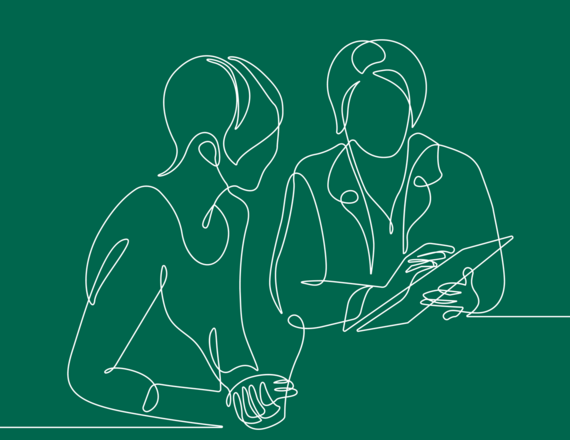Closing the Gap in Mental Health Care Workforce
Dartmouth Health training empowers master’s-educated clinicians
When Deb Fournier, MHCDS, MSN, APRN, PMHNP-BC, ANP-BC, the lead advanced practice provider (APP) for the Department of Psychiatry, was looking to hire additional psychiatric-mental health nurse practitioners (PMHNPs) to care for Dartmouth Health (DH) patients, she found very few whose training met her high standards. She decided to find out why.
“Students in most PMHNP programs have to find their own clinical rotations” to complete their master’s degree, says Fournier, who is now the chief APP officer for Dartmouth Health. “The quality of those training experiences is highly variable, and many students are then not prepared to successfully transition to clinical practice when they graduate.”

So Fournier and her colleague, Laura Kelliher, MPP, MSN, APRN, CPNP-PC, PMHNP-BC, decided to develop a focused program for PMHNP clinical training within the Department of Psychiatry. Although Geisel doesn’t have PMHNP or master’s in social work (MSW) degree programs, DH has offered clinical hours for these master’s-prepared students from other institutions in the past in an ad hoc fashion. But now, these clinical experiences are offered as formal educational programs for PMHNP students, pre-licensure MSW students, and post-master’s social workers seeking licensed independent clinical social worker (LICSW) credentials.
Fournier’s hiring standards for PMHNP practitioners are being fully satisfied by students completing the program.
“Of the last eight open positions, we’ve filled six with our own trainees,” Fournier says. And “since we design their experience and support our preceptors, they receive high-quality training.” Hiring these trainees has also decreased onboarding time, getting new clinicians into action faster.
These programs not only expand the qualified mental health care workforce in northern New England, but they also help to alleviate the national shortage of mental health care clinicians. Healthcare systems across the country are working to hire more providers, including PMHNPs and LICSWs, to meet the increasing demand for mental health care services. Although the skills these master’s-prepared clinicians have learned are different from medically trained psychiatrists and doctoral-trained psychologists, these providers are qualified to offer many kinds of mental health treatment and, in turn, reduce the long waiting lists for people in need of care.
Seeing a need, meeting a need
DH has long been helping to mitigate the gaps in clinical training for PMHNPs, MSW students, and LICSWs by providing proactive students and trainees with high-quality clinical experience. But the hospital system had no formal programs.
“Students can get their master’s degree online from a school anywhere in the country, but those schools don’t always arrange clinical exposure for them. So, students sometimes reach out to us to ask for clinical hours,” says Julia Frew, MD, MED ’05, RES ’10, the vice chair of psychiatry education in the Department of Psychiatry and an associate professor of psychiatry, of obstetrics and gynecology, and of medical education at Geisel. After years of providing clinical experience for these students on a case-by-case basis, “we asked ourselves: ‘How can we use what we’ve learned about education and clinical training for medical students and residents, and apply that to train other professionals?’”
The Department of Psychiatry launched its formal PMHNP training program in 2020, creating an avenue for interested learners to complete an application and go through an interview process—similar to what potential physician residents would do for clinical training. Accepted students progress through their rotations under the supervision of PMHNPs in the department. In fact, every PMHNP employed at DH who is eligible to serve as a clinical educator or preceptor is now engaged in teaching students, increasing DH’s capacity to provide these clinical experiences.
“We quadrupled our capacity to accept students” since formally launching the program, Fournier says.
In 2022, the clinical training program expanded to include MSW and LICSW students. In addition to training learners from other institutions, DH also offers training for its own non-clinical social workers who want to earn a clinical license. These DH employees can enter the post-master’s program, in which trainees practice one-on-one therapeutic interventions with patients. Together, these new clinical training programs are expanding the psychiatry department’s capacity to treat patients—even before the learners have completed their program.
“If a patient comes in with depression, a [post-master’s] clinical trainee can provide 15 sessions of cognitive behavioral therapy, which is the same treatment they might receive at a community mental health center,” explains Lucy Pilcher, LICSW, director of education for social work and mental health and a psychiatry instructor at Geisel. She helped establish the training programs for MSW students and LICSWs.
Promoting interprofessional collaboration
Now that the programs are formalized at DH, MSW students, LICSW candidates, and PMHNP trainees practice clinical skills at Dartmouth Hitchcock Medical Center (DHMC) and several associated clinics. The nurse practitioners can also train at New Hampshire Hospital, where the psychiatry department recently opened a collaborative space called the Lori Shibinette Interprofessional Education (LIFE) Center, named after a former New Hampshire Hospital CEO in honor of her commitment to behavioral health workforce training. All graduate-level trainees—PMHNP students, psychiatric residents, and others—learn and work together in the LIFE Center.
“Interprofessional practice means [different clinicians] understand each other’s models and ways of talking about problem-solving,” says Jeff Fetter, MD, chief medical officer at New Hampshire Hospital and assistant professor of psychiatry at Geisel. “You not only avoid misunderstandings, but you also are leveraging each other’s strengths. When we put our heads together, we’re more than the sum of the parts.”
Frew adds, “In the real world, all the care we provide takes place in teams, so it’s really important to learn what the different roles are and their training background. Getting to know one another during training will set the students up to work well in teams, wherever they end up.”